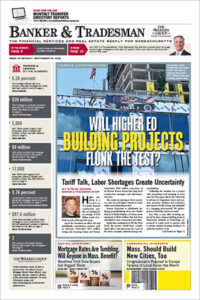Transfer tax supporters’ ideas have merit, and may be getting traction as policymakers search for more housing funding, but Beacon Hill shouldn’t approve these bills without making sure the extra money will actually be spent on new housing.
Real estate lobby groups threw nearly a dozen counter arguments back at transfer tax supporters during a State House hearing last week. Some of the towns and cities that are seeking transfer taxes haven’t, like Boston, maxed out their taxing authority under the Community Preservation Act.
Others aren’t putting most of their existing CPA funds towards housing creation and preservation and many aren’t transparent about what this money is spent on, they noted, citing a report from the Tufts University Center for State Policy Analysis earlier this year.
And as 2023 is showing, transfer taxes aren’t a stable source of affordable housing funding on their own. Any time there’s an economic downturn or the threat of one, both luxury home sales and commercial real estate sales will slow, making Boston Mayor Michelle Wu’s favorite figure of a $100 million haul in a single year – calculated off of 2021’s sales figures – somewhere between naïve and laughably useless as a tool to quantify a transfer tax’s benefits.
Also laughable? Arguments from real estate groups that a transfer tax aimed at properties worth $1 million or more would harm housing affordability or somehow “steal” from property owners by capturing a small portion of the wealth created by our incredibly unfair, supply-constraining land use rules.
It’s an unavoidable economic fact that more money for affordable housing creation is needed. It may also turn out to be an unavoidable political fact that municipalities will demand their own pots of money to hand out to local affordable housing projects – as performative as some of these local efforts may be.
If legislators or the Healey administration decide to get behind local transfer taxes as a way to generate more housing dollars, they should take a page from the state’s natural gas ban pilot and put guardrails to make sure the resulting funds won’t be good money after bad.
Cambridge officials effectively rejected a medium-sized affordable housing development on Massachusetts Avenue a short distance from a subway station under pressure from a city councilor opposed to its height – comparable to existing, nearby apartment buildings. Concord voters not too long ago shot down a highly modest upzoning proposal for a retail plaza near their train station. And Nantucket’s zoning code is better described by all the housing it prevents than what construction it allows, despite local retailers literally having to fly workers in from the mainland each day thanks to the island’s housing shortage.
If the likes of Chatham and Arlington want a transfer tax, they should have to make sure they are, in the Boston mayor’s words, “already using every lever [they] have access to at the local level” to unlock more housing development using the most effective tool we’ve yet discovered: rezoning for moderately dense housing development by-right.
Without doing this first, local transfer tax money will only be good for paying consultants’ fees as affordable housing projects wade through the all-too-common morass of community meetings and zoning variance hearings that towns have long used to stop development.
Letters to the editor of 350 words or less responding to this editorial or other topics may be submitted via email at editorial@thewarrengroup.com with the subject line “Letter to the Editor.” Submission is not a guarantee of publication.






